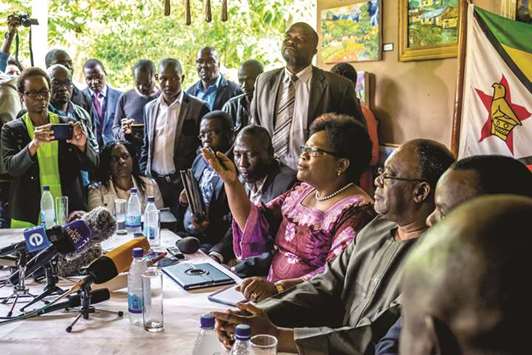A political source who spoke to senior allies holed up with Mugabe and his wife, Grace, in his lavish “Blue House” Harare compound said Mugabe had no plans to resign voluntarily ahead of elections scheduled for next year.
“It’s a sort of stand-off, a stalemate,” the source said.
“They are insisting the president must finish his term.”
The army’s takeover signalled the collapse in less than 36 hours of the security, intelligence and patronage networks that sustained Mugabe through 37 years in power and built him into the “Grand Old Man” of African politics.
The priest, Fidelis Mukonori, who has been mediating between Mugabe and the generals who seized power on Wednesday in a targeted operation against “criminals” in his entourage, had also made little headway, a senior political source told Reuters.
The army appears to want Mugabe, who has led Zimbabwe since independence from Britain in 1980, to go quietly and allow a smooth and bloodless transition to former vice-president Emmerson Mnangagwa.
Still seen by many Africans as a liberation hero, Mugabe is reviled in the West as a despot whose disastrous handling of the economy and willingness to resort to violence to maintain power pauperised one of Africa’s most promising states.
Once a regional bread-basket, Zimbabwe’s economy collapsed in the wake of the seizure of white-owned farms in the early 2000s, followed by runaway money-printing that catapulted inflation to 500bn% in 2008.
Millions, from highly skilled bankers to semi-literate farmers, emigrated.
Most went to neighbouring South Africa, where an estimated 3mn still live, despite a brief economic revival under a 2009-13 power-sharing government.
A fighter, both literally and figuratively during a political career that included several assassination attempts, Mugabe now appears to have reached the end of the road.
With the army camped on his front door and the police – once seen as a bastion of support – showing no signs of resistance, force is not an option.
Similarly, he has no popular backing in the capital, where he is widely loathed, and his influence in the ruling ZANU-PF party is evaporating.
ZANU-PF youth leader Kudzai Chipanga, a vocal Mugabe supporter, publicly apologised for opposing the army after being marched into the state television headquarters to read out a statement, sources at the broadcaster said.
He was then taken back to the army’s main KGVI (pronounced KG Six) barracks in Harare, where Finance Minister Ignatius Chombo is also being held, an army source said.
Video footage obtained by Reuters from the houses of two key Grace Mugabe allies – cabinet ministers Jonathan Moyo and Saviour Kasukuwere – indicated that the army was also prepared to use lethal force if necessary.
Moyo’s front door was blown open with explosives, scattering glass across the entrance hall, while the inside walls of Kasukuwere’s house were pocked with bullet holes.
The pair managed to escape on the evening of the coup and make it to Mugabe’s compound, where they remain under effective house arrest, one political source said.
Zimbabwean intelligence reports seen by Reuters suggest Mugabe’s exit was in the planning for more than a year.
Mnangagwa, a former security chief and life-long Mugabe confidant known as “The Crocodile” who was axed as vice-president earlier this month, is the key player.
According to the files and political sources in Zimbabwe and South Africa, once Mugabe’s resignation is secured Mnangagwa would take over as president of an interim unity government that will seek to stabilise the imploding economy.

